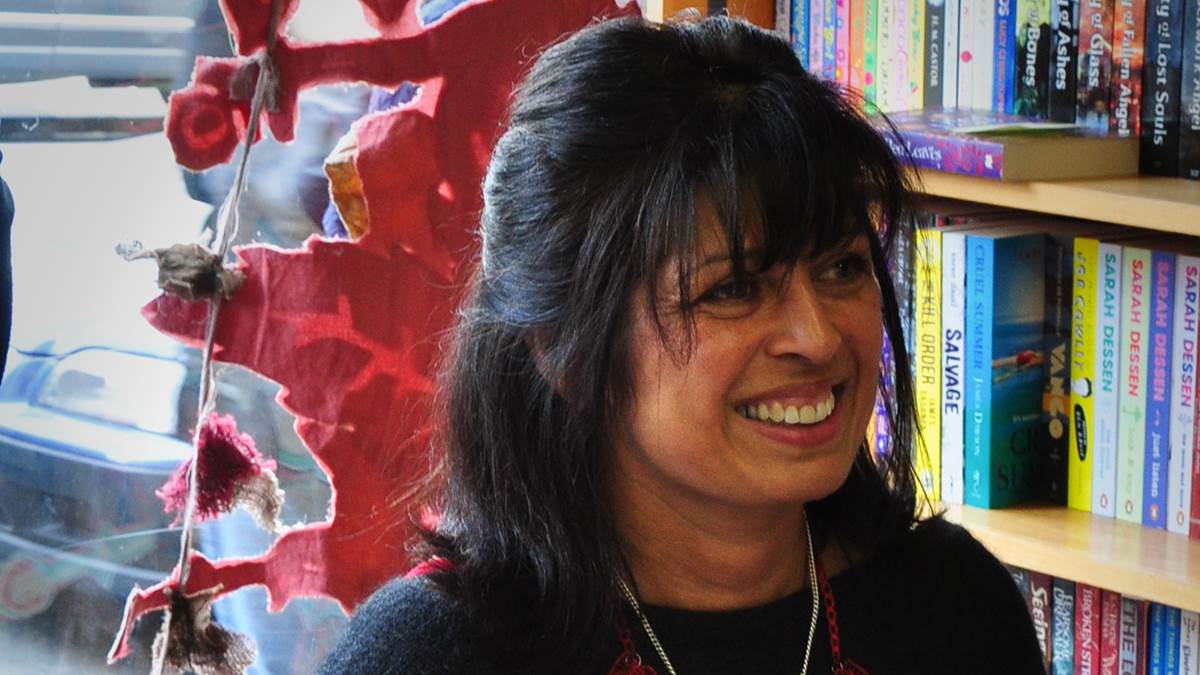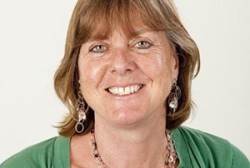'Writers are the authors of empathy' says Miranda McKearney OBE, founder of Empathy Lab
Published on: 03 August 2015 Author: Sita Brahmachari
The brilliant award winning author and campaigner Sita Brahmachari, who's work includes the Red Leaves and Artichoke Hearts, became our twelfth Writer in Residence back in 2015. In this blog Sita spoke to Miranda McKearney, founder of EMpathy Lab, about encourgaing empathy in children through books.

In this conversation Miranda McKearney and I explore the question:
'Are we missing the central piece of the reading jigsaw - developing a language to talk about feeling in stories that could lead to an empathy revolution?'
I have written before about the instinct to write stories for children to help them navigate the complex nature of our world. In this conversation with Miranda we discuss how stepping into the shoes of others is central to that navigation and the work of EmpathyLab.
When visiting schools (whether through my work in community theatre or as a writer) I have said to children that I believe the hardest and most important skill that you can learn is empathy.
Hidden in the pockets of my storytelling quilt is an assortment of shoes from baby shoes to converse, to vintage shoes, and a pair of dusty sandals. Whichever shoes a student discovers I ask them to wear them.
'I can't wear these - They don't fit!' the volunteer usually says. This is the playful way we begin a deep conversation about how we can walk in someone else's shoes, feel their sense of happiness, sadness, pain and struggles and bring our imagination to their experience as we do when we read a story that really engages us.
The late educationalists Noel Greig introduced me to a wonderful project in which he asked every person in a room (It was a family session - so there were people of all ages from grandparents to babies) to draw around their feet and then write about the places they have most often walked in their lives. In a diverse society, this simple exercise with the youngest child can create a beautiful collection of paper feet that have already travelled the world.
The next stage of the project is to ask 'How difficult is it to step into someone else's shoes?' 'What skills do you need?' 'What makes it difficult?' 'What makes it easier?'
We keep these questions in mind when different people pair together and walk and talk about their often vastly different stories and journeys. The pairing can include a teacher and a child, two mothers, children of different ages, people who share little language, a school cook and a head teacher.

I worked in one school where the beautifully decorated story shoes the children had made were mounted on a wall to form a path where children queued for lunch. I charted the conversations prompted by reading the journeys that were written into each shoe... some were anonymous and some were named.... but what came out of that project was that everyone learned something new about the people whose shoes they had metaphorically walked in - and all these shoes belonged to people who belonged to the school community. The resource offers endless potential to discover the story of another human - another character and to truly empathise with them.
It is this potential for harnessing the power of stories to develop empathy that Miranda McKearney is now exploring through her start-up 'Empathy Lab'. As she says...
'The word empathy might seem quite soft, but to truly empathise with another person is transformative and fundamental to children's life chances. With society's big empathy gap showing in alarming levels of bullying, homophobia and religious intolerance, we need new empathy education strategies. Empathy is a skill that all of us can learn, and stories are a powerful tool".
How did Empathy Lab come about?
When I stepped down as the founding CEO of The Reading Agency, a national charity, there was one area I still wanted to explore - this was whether more could be done to exploit the power of words and stories to help children build the emotional literacy they need to thrive. All my work has been grounded in social justice aims, and for me, empathy is a revolutionary force for social change. It helps us focus less on our individual needs and more on strong relationships and a common humanity.
I have four amazing Empathy Lab co -founders from different areas of my life:
- Sarah Mears: Library Service Manager, Essex Libraries and national Chair, Association of Senior Children's and Education Librarians
- Ruth Harrison: 25 years' literature development experience. Director of Spread the Word.
- Caroline Scott: 38 years' teaching experience with a remit for inclusion and behaviour. Now working in a pupil referral unit.
- Craig Hill: 20 years' experience developing pioneering digital and social marketing agencies, focusing on children and family audiences.
We started exploring if more could be done to convince society to use stories more systematically in building children's emotional skills. We have spent 15 months researching and along the way we've encountered powerful empathy thinkers, like the author Roman Krznaric who is building an Empathy Museum.
We were fascinated by a growing body of research showing how stories can build our empathy skills. Neuroscientists at USA's Emory University say that fiction tricks our brains into thinking we are genuinely part of the story. The empathy we feel for characters wires our brains to have the same sensitivity towards real people[1].
In October 2014 we held a 'Think In' at the South Bank Centre's Literature Festival. We tested our emerging ideas with a zinging mix of 120 people: child development and wellbeing specialists, neuroscientists, librarians, authors, teachers, publishers and parents. They all said there was a need for more joined up work between emotional literacy and the experience of reading and writing.
Since then we have been developing our thinking about what Empathy Lab might do, and starting to apply for funding. We had a huge amount of interest in a recent Guardian article.
A child lacking in empathy will struggle to collaborate, communicate effectively or form the strong teacher/student and peer/peer relationships they need to succeed as a learner. This means we are encountering a demand for CPD training for teachers who say that empathy is the bedrock for collaborative learning and a great classroom climate. And that they'd like to find a more systematic way to join up work on phonics and reading for pleasure with social and emotional education. They can see how a more focused use of stories can help children build the foundational skill of empathy.
We're harnessing this interest by starting a small, experimental Trailblazing Schools Group to help us test some empathy education approaches. We are holding an autumn 2015 briefing day at the Centre for Literacy in Primary Education. Working with 15 schools we will explore the best ways to use words and stories to help children develop:
- The vocabulary to recognise other people's feelings
- Effective communication: active listening and deep conversation
- Strong imagination to enter into others' feelings
- The ability to value, understand and respect other people's experiences and views
- The ability to put empathy into action through pro-social attitudes and behaviour - in the home, school and community
- improved literacy through enhanced emotional engagement with texts.
Can you talk about the link between the Patron of Reading scheme and Empathy Lab?
We had a great response from authors after my speech at a recent Patron of Reading conference. Liaising with writer Helena Pielichaty, we have begun testing some of our thinking with this wonderful grassroots organisation, which places authors in schools as champions of reading .
We see authors as a powerful catalyst in a drive to help children develop empathy. To create compelling characters, writers use empathy in spades; they're empathy experts. We hope to build an army of authors helping lead a movement to connect literacy and reading for pleasure more closely with social and emotional education. As part of this we hope to work with several Patron of Reading schools.
We're also delighted to have Bali Rai and Gillian Cross on our Reference Group, and to have the support of Jacqueline Wilson, Neil Gaiman, Cressida Cowell and a raft of other authors.
Our librarian, Sarah Mears, is currently co-ordinating our trial resources. These include curated book lists and Storykits, which build empathy boosting activities around a single text, with an emphasis on practical social action. For instance, a book on homelessness might be a focal point to go on a CentrePoint sleepout or invite Big Issue sellers in to talk about their lives. Between September 2016 and May 2017 we will test ways for authors and teachers to share more widely, including through a newly established national Empathy Day.
Wouldn't it be amazing if every single child was putting into practice the empathy skills to respect, value and care for themselves, other people and the world? We're inspired by the power of empathy to make the world a better place, and the power of stories to build empathy.
Topics: Writer in Residence, Features






Add a comment